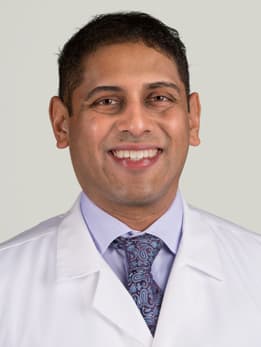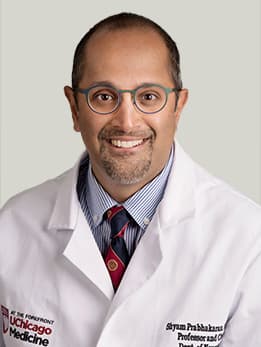Heart-Brain Clinic
Heart-Brain Clinic
As one of the first heart-brain clinics in Chicago, the University of Chicago Medicine has a team of cardiology and neurology specialists who collaborate to diagnose, treat and prevent conditions that impact the heart and brain, such as atrial fibrillation (AFib) or cryptogenic stroke. We are committed to delivering the highest level of care to patients, especially those with advanced or complex disease requiring state-of-the-art therapies or second opinions.
Multidisciplinary Approach for a Continuum of Care
We understand the complex conditions that connect the heart and brain. Our team of experts in cardiology and neurology work together from the initial diagnosis and continues through treatment and follow-up care. We provide a continuum of care that includes one-stop appointments with neurology and cardiology specialists and on-site labs for your convenience.
Our experts work together to ensure you are receiving the best care for your condition. During your appointment, we evaluate your existing condition(s) and symptoms, as well as discuss your healthcare goals to design a treatment plan tailored to your individual needs. The heart-brain clinic also welcomes patients seeking second opinions for their diagnosis.
Heart and Brain Related Conditions We Treat
Heart Disease
There are several heart conditions that can cause or significantly increase the risk of brain damage. Since the heart is responsible for pumping blood through the entire body, it can also be a source of strokes—i.e. blockages of blood vessels in the brain. If blood clots form in the heart, they can travel to the brain and cause a stroke.
There are a number of specific conditions that can increase the risk of a blood clot forming in or passing through the heart and thereby causing a stroke. These conditions include:
The goals of atrial fibrillation treatment are to reduce the risk for complications associated with the arrhythmia, such as blood clots or stroke, and in some cases to return the heart to a normal rhythm.
This is a congenital defect where a hole has formed in the wall of tissue that separates the right and left atria (upper chambers of the heart). ASDs cause oxygen-rich blood to mix with oxygen-poor blood, which can result in oxygen-poor blood being delivered to vital organs and to abnormal enlargement of the right atrium. Large ASDs can eventually lead to pulmonary hypertension, heart failure or stroke.
Similar to an ASD, a patent foramen ovale is a type of hole in the septal tissue that separates the upper chambers of the heart. With a PFO, instead of an open hole, there is a flap-like structure that opens when there is pressure in the chest, such as during a cough or a sneeze. While it doesn’t affect the heart’s ability to do its job, a PFO can allow a blood clot from a vein to skip the lungs and make its way to the brain and cause a stroke.
Carotid artery disease is the narrowing in one or both of the carotid arteries. Most frequently, this narrowing results from atherosclerosis, or "hardening of the arteries due to plaque." Atherosclerosis can be associated with high blood pressure, diabetes and heart disease. Carotid arteries channel blood to the brain, and if they become too narrow, a stroke or a transient ischemic attack (mini-stroke) may occur.
Congenital heart defects (CHD) develop before birth when one or more heart structures (valve, walls and/or vessels) have abnormal formations, weaknesses or other flaws that prevents normal heart functions. As a patient with congenital heart disease, over your lifetime, your heart can weaken, become damaged or lead to serious comorbidities, such as heart failure, arrhythmias or coronary artery disease, which can all lead to stroke.
Similar to atrial septal defect (ASD), ventricular septal defect is characterized by a hole in the heart, more specifically a hole between the lower chambers of the heart. This means that oxygen-rich blood and oxygen-poor blood mix before moving to the lungs, and the extra effort required for the heart and lungs to work properly can cause heart failure, arrhythmia and stroke over time.
Brain Conditions
A stroke occurs when blood supply to the brain is interrupted or reduced. There are several types of stroke and stroke-related conditions:
- Ischemic stroke
- Cryptogenic stroke
- Hemorrhagic stroke
- Transient ischemic attack (TIA)
- Vascular dementia
Since each type of stroke has a different type of treatment, it is very important to determine the cause of the stroke, as well as the location, as quickly as possible.
If you’ve had a cryptogenic stroke or TIA, our experts can offer a second opinion.
It is common for patients with a diagnosis or family history of stroke to also have an underlying heart condition. You may benefit from the heart-brain clinic if you’ve had a stroke and have one of the following:
- Atrial fibrillation (AFib)
- Patent foramen ovale (PFO), atrial septal aneurysm, atrial septal defect (ASD)
- Congestive heart failure
- Coronary artery disease
Risk Factors Associated with Heart-Brain Disease
You may not automatically assume that having a heart- or brain-related condition could also increase your likelihood for additional underlying diseases. Understanding the risk factors associated with heart disease and/or brain injury can help you recognize what, if any, previous disease, lifestyle or genetic influences pose a threat of a more severe, and possibly fatal, condition.
Common risk factors include:
- Family history of stroke: It has been shown that there are higher incidences of stroke if one or more family members have been previously diagnosed
- Suspected/previous stroke: A previous stroke increases your chances of additional strokes in your lifetime
- Heart conditions without proper diagnosis and/or treatment to prevent stroke: Being diagnosed with a heart condition that can lead to blood clots that can travel to your brain if not treated early
- Hypertension (high blood pressure): Uncontrolled hypertension puts you at risk of heart disease that can damage arteries which can ultimately cause blockages or ruptures in vessels that supply blood to the heart and/or brain
Nonsurgical and Surgical Treatment Options
Each patient is unique, so our comprehensive range of treatment options allows us to customize your care to best meet your specific needs. With advanced medications, medical devices and surgical techniques, we personalize treatment plans that may include one or more of the following:
Depending on your diagnosis and any risk factors and/or underlying issues, our team might recommend medication to manage or control your condition and prevent a stroke. Carefully chosen, FDA-approved medications can enhance the heart’s function and improve symptoms, including:
- Anticoagulants (novel oral anticoagulants, warfarin) to thin blood in order to prevent clots/stroke
- Antiplatelet agents (aspirin, clopidogrel, ticagrelor) will stop blood from clumping and creating clots
- Blood pressure medications to widen blood vessels and lower blood pressure
- Cholesterol medications (statins, ezetimibe, PSK-9 inhibitors) to lower cholesterol and reduce plaque buildup in arteries
- Heart rate and rhythm control agents (beta blockers, anti-arrhythmics) to help maintain a standard heart rate
The left atrial appendage (LAA) is a small pouch in the muscle wall of the left atrium. When a patient has atrial fibrillation, this pouch can collect blood that can form clots, creating an increased risk of stroke. To minimize this risk, our interventional cardiologists seal the LAA through catheterization, preventing blood from gathering in the appendage and giving patients the ability to safely come off blood thinner therapy.
We are one of the few centers to offer both left atrial appendage closure (LAAC) implant devices, FDA-approved WATCHMAN and AMULET, to prevent stroke-causing blood clots from escaping from the heart for patients who cannot take or have higher-than-normal risk of bleeding with oral anticoagulants. This minimally invasive procedure uses a permanent implant to seal off the pouch in the heart to prevent blood clots. Tissue grows over the implant and patients are able to eventually come off of blood thinners
Our interventional cardiologists use percutaneous techniques to treat a wide range of congenital heart defects. Through catheterization, a "plug" can be fed through a thin tube and inserted in the heart to block any leaks or close holes for patients with atrial septal defects, patent foramen ovales and ventricular septal defects.
Our team may recommend a loop recorder implantation device if you have an arrhythmia (abnormal heart rhythm), or conditions like unexplained stroke or syncope (fainting), in order to get a more accurate understanding of your heart’s normal function. By monitoring your heartbeat, we can determine whether symptoms and conditions are related to abnormal pulsations, such as AFib and other heart rhythm disorders, and can understand how much time your heart spends in an abnormal rhythm.
In addition to standard treatment options, we also transform basic research into bedside care for our patients through innovative clinical trials, providing our patients with access to the most advanced therapies available. Currently, our clinical trials are focused on evaluating the best treatment option for patients diagnosed with atrial fibrillation who have had a recent stroke. This trial is using anticoagulant medication, rather than aspirin, to better prevent recurring cryptogenic stroke in patients managing AFib.
Our Heart-Brain Clinic Team
Request an Appointment
We are currently experiencing a high volume of inquiries, leading to delayed response times. For faster assistance, please call 1-888-824-0200 to schedule your appointment.
If you have symptoms of an urgent nature, please call your doctor or go to the emergency room immediately.
You can also make an appointment with our providers by:
– Scheduling a virtual video visit to see a provider from the comfort of your home
– Requesting an online second opinion from our specialists
* Indicates required field



